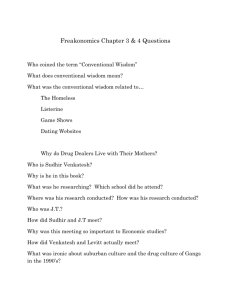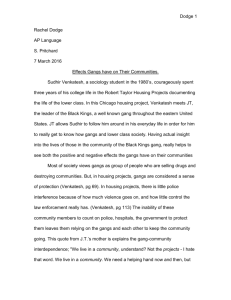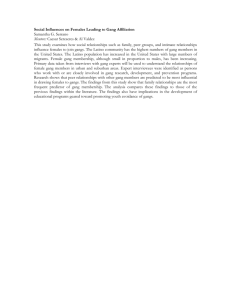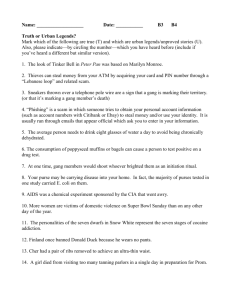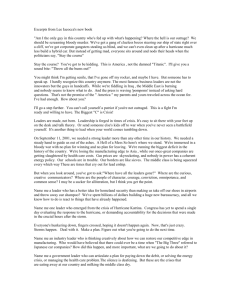SOCIOLOGY Short Assignment #2
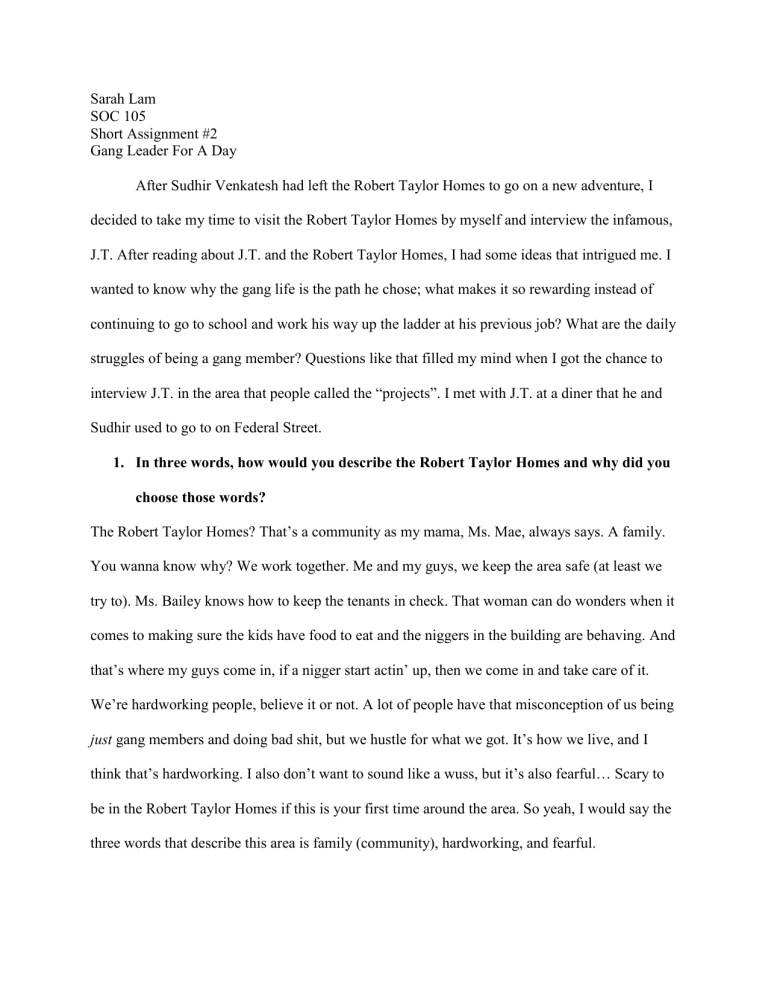
Sarah Lam
SOC 105
Short Assignment #2
Gang Leader For A Day
After Sudhir Venkatesh had left the Robert Taylor Homes to go on a new adventure, I decided to take my time to visit the Robert Taylor Homes by myself and interview the infamous,
J.T. After reading about J.T. and the Robert Taylor Homes, I had some ideas that intrigued me. I wanted to know why the gang life is the path he chose; what makes it so rewarding instead of continuing to go to school and work his way up the ladder at his previous job? What are the daily struggles of being a gang member? Questions like that filled my mind when I got the chance to interview J.T. in the area that people called the “projects”. I met with J.T. at a diner that he and
Sudhir used to go to on Federal Street.
1.
In three words, how would you describe the Robert Taylor Homes and why did you choose those words?
The Robert Taylor Homes? That’s a community as my mama, Ms. Mae, always says. A family.
You wanna know why? We work together. Me and my guys, we keep the area safe (at least we try to). Ms. Bailey knows how to keep the tenants in check. That woman can do wonders when it comes to making sure the kids have food to eat and the niggers in the building are behaving. And that’s where my guys come in, if a nigger start actin’ up, then we come in and take care of it.
We’re hardworking people, believe it or not. A lot of people have that misconception of us being just gang members and doing bad shit, but we hustle for what we got. It’s how we live, and I think that’s hardworking. I also don’t want to sound like a wuss, but it’s also fearful… Scary to be in the Robert Taylor Homes if this is your first time around the area. So yeah, I would say the three words that describe this area is family (community), hardworking, and fearful.
2.
In terms of hardworking, was the gang life the path that you chose originally? Can you tell me about it?
There is no way in hell that I thought my life would be like this ten years back. Ten years ago, I was in school working for a degree and working. I worked my ass off at this job, tryna get a promotion and shit until someone else got it. I saw the loser that got the promotion that I worked hard for. After that, I quit everything. I came back here and that’s when I joined the gang. I was young and stupid, but even til’ this day, if I wanted to go back to school and work, I don’t think I can now that I’m part of the Board. They’d kill me if they thought I’d take my time and dedication away from BK to chase after something else. But then you have the part where it’s so rewarding.
3.
Instead of going back to work and school like you said, what makes being in a gang so rewarding?
You get that sense of family. I get to choose who to recruit, I get to choose who stays and goes.
This is my family. And I ain’t gonna lie, the money makes it worth while. I made… What?
Minimum wage at my “real” job? Now I be makin’ at least a hundred grand a year. Maybe even more. It’s easy to hustle on the streets than it is in a nine-to-five job.
4.
What are some of the struggles of being in a gang?
Anything can happen. You could be an innocent person walking the streets of the homes and you could be shot up. It don’t matter who you are. Them other gangs don’t know if you ridin’ with the Black Kings. They automatically think that if you’re in the area, then you’re part of us.
Taking care of everyone else is also a struggle. We can’t always be at a certain place at a certain time. There’s also a sense of danger of being in a gang. You don’t know if the niggers in your group are gonna turn their backs on you and kill you. You don’t know what the Board of
Directors be thinking about at meetings. That’s one thing of being a leader , not just a member.
You don’t know what’s going to happen to you until it happens.
5.
Lastly, how would you describe Sudhir Venkatesh?
Sudhir got balls. *laughs* He spent so much time fucking around with me and my guys while he went to school down here. A lot of my guys actually really liked him. I remember the last time I saw him, I wrote a letter to my friend Billy Jo up in New York, I said, “Billy, Sudhir is coming out your way. Take care of the nigger…. He’s with me.” (Venkatesh, pg. 211 on the online book)
He told me he ain’t ready for another “project” yet. There’s nothing else he can do up in New
York besides teach, all he knows how to do is “hang out with niggers like us” (Venkatesh, pg.
211 on the online book). Sudhir… He’s my friend. That’s how I would describe him.
While interviewing J.T., one of the most familial concepts that came to mind was culture of poverty. The Robert Taylor Homes didn’t have a lot of what the middle-class suburban residents outside of the projects had. They all came together in order to adapt and survive in the difficult economic circumstances (especially during the cold winters). Like Ms. Mae said, they worked together as a community. Following culture of poverty while we were discussing money, absolute poverty came to mind. A lot of the tenants in the Robert Taylor Homes weren’t able to provide for their families, and that is where Ms. Bailey came to the rescue. While asking J.T. about his previous job, I also saw racism in his situation at work. He lost the chance of a promotion to a white man (who obviously wasn’t up to par over J.T.). It was hard for J.T. to progress in the work field due to racism, and that is what caused him to return to the projects and the gang life (Venkatesh, pg. 31 on the online book). J.T. and the way he ran his gang had my full attention while reading this book, and I’ve always been intrigued with the power that a gang leader has. It was a pleasure to interview him and learn a thing or two.
